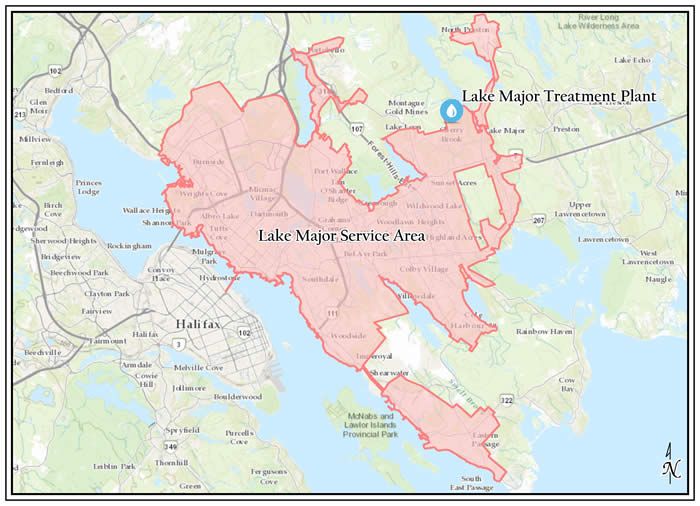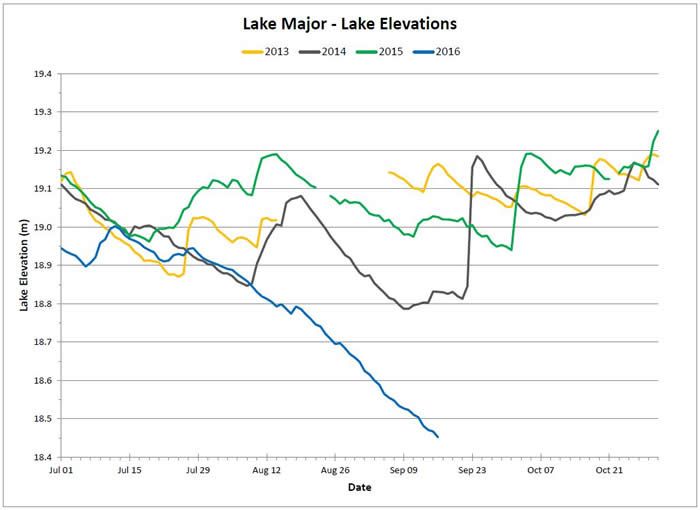Mandatory water restrictions in place for N.S. residents
Digital Reporter
Monday, September 19, 2016, 5:25 PM - Historic low water levels in Lake Major has forced Halifax Water to impose mandatory water restrictions for several communities in Nova Scotia.
Hot and dry weather has impacted the lake that supplies water to residents and businesses in Dartmouth, Cole Harbour, Westphal, North Preston and Eastern Passage.
In order to conserve water, the utility is asking around 32,000 customers to stop watering gardens, lawns, plants and other outside water usage like filling up pools. Commercial car washes remain available for the time being, however, residents are asked to not wash their cars, RVs and other vehicles.
![]() FALL IS BACK: After a hot summer what can Canadians expect from fall? Find out with The Weather Network’s 2016 Fall Forecast | FORECAST & MAPS HERE
FALL IS BACK: After a hot summer what can Canadians expect from fall? Find out with The Weather Network’s 2016 Fall Forecast | FORECAST & MAPS HERE
"These water restrictions are being implemented to maintain essential water service for all customers in the Lake Major service area," says a Halifax Water statement. "Conserving water will help avoid a potentially serious situation involving future water outages."

It is estimated that it would take upwards of 150 mm of rain to get Lake Major back up to sufficient levels. Halifax Water officials say the lake level around the dam is about three feet lower than normal.
Low water level at Lake Major Dam. Mandatory water use restriction details at https://t.co/AUZ5ezbBWF pic.twitter.com/2ofFvdcEG2
— Halifax Water (@HalifaxWater) September 19, 2016
While all of the utility's supplies are currently low, only Lake Major is low enough to warrant mandatory restrictions. Pockwock Lake, located northwest of Lake Major, is still in good shape with no water restrictions in effect, according to James Campbell, spokesperson for Halifax Water.

However, all residents are encouraged to practice at lease some form of water conservation such as only washing full loads of laundry, or taking shorter showers.
"We usually start to get a recharge of all our reservoirs around the middle of August, but that just hasn't happened this year," Campbell told CBC. "We haven't had the rainfall."

"If you went to any lake around HRM you can find a general dry water mark that shows how low the lakes actually are," he told CBC. "It's pretty shocking."
Although the province saw some rain over the weekend, The Weather Network meteorologist Matthew Grinter says it's not enough.
"Even though they received what seems to be two full days of rain over the weekend into Monday, it's enough to create a wet layer at the surface of the soil where the grass grows, but it's not enough to make a big impact on the water table and the drought-stricken trees," says Grinter.
Communities experiencing the most severe drought conditions include the communities of Argyle, Shelburne and Barrington. Water shortages have also been reported in Chester and Guysborough County, though conditions are not as serious.
Environment Canada climatologist David Phillips told CBC the dry spell in Nova Scotia is just a "dress rehearsal" for what is to come in Canada.
"These are little teasers, little dress rehearsals of what we're going to be challenged with more in the future," Phillips told CBC. "It's not your grandparent's weather anymore. It's a new weather and it's weird, wild and wacky."
![]() FALL IS BACK: After a hot summer what can Canadians expect from fall? Find out with The Weather Network’s 2016 Fall Forecast | FORECAST & MAPS HERE
FALL IS BACK: After a hot summer what can Canadians expect from fall? Find out with The Weather Network’s 2016 Fall Forecast | FORECAST & MAPS HERE
Municipal Affairs Minister Zach Churchill says this is the first time Nova Scotia has ever experienced such an unprecedented dry spell.
"This is a first, according to the records of Environment Canada," Churchill told CBC. "We have never had a dry spell like this in this part of the country."
Canadians can expect more dry spells in the future as temperatures continue to rise across the country, according to Phillips. The climatologist says certain measures should be taken to save reservoirs from drastically depleting in the future including, digging deeper wells.
"Don't think that this was a one-off," he told CBC. "What we need to do is learn from this and figure out how we build resilience and cushion the blow, because you can't stop the weather."
SOURCE: CBC | Halifax Water



